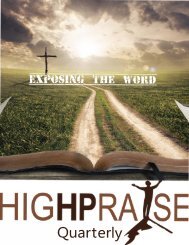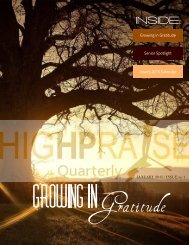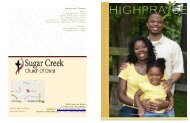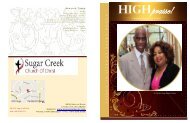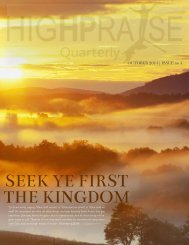Q1 2016
Final HP Jan 2016
Final HP Jan 2016
Create successful ePaper yourself
Turn your PDF publications into a flip-book with our unique Google optimized e-Paper software.
By Tina Price
Imagine<br />
that you are an African American male driving down<br />
a dark street. All of a sudden, you lose control of your car.<br />
You crash into several trees. Your car is totaled, and your<br />
only way of escape is to climb out of the shattered back<br />
window of your car. Unfamiliar with the area, you run<br />
desperately to the first house you see for help. A white<br />
woman comes to the door. She feels threatened by you and<br />
mistakes you for an intruder, so instead of helping you, she<br />
frantically calls 911. You see three police officers. As you<br />
approach, one of the officers, a white male named Randall<br />
Kerrick, shoots you in cold blood, not once, not twice, but<br />
twelve times. These are the facts that led to the untimely<br />
death of Jonathon Ferrell, a twenty-four year old, unarmed<br />
African American male. These shocking events took place<br />
here, in Charlotte, North Carolina. Unfortunately according to<br />
North Carolina laws and the laws of the majority of other<br />
states, ?unarmed is not harmless, and a body can be a<br />
weapon.? So if a person appears to be a threat, a police<br />
officer has the right to use any amount of force for his own<br />
protection. In this article, I will first explain the components<br />
and effects of the Stand Your Ground laws. Also, I will offer<br />
suggestions to ultimately remedy the effects of the Stand<br />
Your Ground laws.<br />
The Stand Your Ground laws specific to North<br />
Carolina provided a basis to free Officer Kerrick from the<br />
charges of voluntary manslaughter. Under these laws, a<br />
police officer may kill a person while on duty if he believes<br />
his own life is in danger. The officer?s fear or belief must be<br />
reasonable. The reasonable standard is one of the lowest<br />
standards in a court of law. Therefore, a police officer may<br />
rely upon racial stereotypes to justify unmerited fear of an<br />
African American alleged assailant. Thus, an African American<br />
male may pose a threat merely based upon the color of his<br />
skin. Even if unarmed, he is presumed to be dangerous. He<br />
looks suspicious. He is violent. If he wears his pants below<br />
his waist, he?s a thug; he?s in a gang. If he makes any sudden<br />
move this poses a risk or the possibility of an attack. In 2015,<br />
a jury was unable to decide whether Officer Kerrick should<br />
be found guilty of voluntary manslaughter. As a result, the<br />
District Attorney decided not to retry the case. Therefore,<br />
Officer Kerrick was free to go, and the government did not<br />
hold him accountable for his actions.<br />
We have all seen the news and heard the stories of<br />
police officers shooting and killing countless unarmed and<br />
presumed to be dangerous African Americans. Trayvon<br />
Martin, Michael Brown, Eric Garner, Timothy Russell, and<br />
Malissa Williams are all unarmed African American victims<br />
killed by police officers. We all know their stories. We felt<br />
the pain and anger. To make matters worse, the officers in<br />
each case escaped a conviction for their crimes. The officers<br />
in each case supposedly had a ?reasonable? fear for their<br />
own lives. Consequently, the officers?actions were justified<br />
because each officer killed his unarmed victim in<br />
self-defense. There is a need to ease the paralyzing effects<br />
of the Stand Your Ground laws. The recent events have led to<br />
feelings of powerlessness, hopelessness, fear, and outrage.<br />
There is no quick answer or solution. However, if the Stand<br />
Your Ground laws did not exist, police officers would not feel<br />
as if they had the right to kill unarmed African Americans. In<br />
short, the United State?s government should get rid of the<br />
Stand Your Ground Laws. If you think back to the Civil Rights<br />
Movement, the African American community participated in<br />
non-violent protests that ultimately urged the government to<br />
create laws to end racial segregation. There is a need for a<br />
similar movement to remove the Stand Your Ground laws<br />
from the books in many states. The Standard Your Ground<br />
laws have ultimately legalized murder. Based upon the laws,<br />
police officers can racially profile African Americans. African<br />
Americans?lives are at stake, and we do not have protection<br />
under the laws of this country. So police officers can<br />
basically kill unarmed African Americans ?presumed to be<br />
dangerous? without any consequences for their actions.
Actions that we can take...<br />
Unarmed and Presumed Dangerous CONTINUED<br />
Aside from large-scale changes in the laws, there are actions that we can take on a smaller scale to<br />
address the effects of the Stand Your Ground laws. First, there is a need for political involvement by the<br />
African American community. Specifically, more African Americans should vote for public officials that have<br />
the power to change the laws. Additionally, African Americans should participate in jury panels for cases like<br />
Travyon Martin and Jonathon Ferrell?s cases. Second, police departments should engage their officers in<br />
cultural competency trainings, and the departments should implement policies that create a system of<br />
accountability. For example, some departments require that their officers wear a body camera while on duty.<br />
Third, police officers should make efforts to bridge the gap between the community police departments.<br />
There is generally a sense of distrust among police departments and the African American community.<br />
Perhaps if police officers interacted more with the community these interactions could dispel feelings of<br />
distrust. These interactions could be informal, such as neighborhood block parties or a community service<br />
events sponsored by the police department. Despite the current effects of Stand Your Ground laws, people<br />
can take steps to decrease the effects.<br />
In line with our mission, the L.I.G.H.T. Ministry[1] plans to address the effects of the Stand Your Ground laws<br />
through a workshop at Sugar Creek Church of Christ on April 23, <strong>2016</strong> at 11:00 am. Part of our mission is to<br />
educate the community of their rights as they relate to various legal matters. Police officers that kill unarmed<br />
and innocent African Americans presumed to be dangerous is a major legal issue within society. During the<br />
Civil Rights Movement, churches were at the forefront of the movement. Likewise, the Church of Christ should<br />
be at the forefront of this movement. The ?Unarmed and Presumed Dangerous Workshop? is open to the<br />
community as well as members of Sugar Creek Church of Christ. We will address the following in the<br />
workshop: (1) the legal framework in which police officers operate, for example, Fourth Amendment and<br />
Stand Your Ground; (2) individual rights such as the right to be free from unreasonable searches and seizures;<br />
(3) what to do when engaged or stopped by police officers; and (4) how police departments and the<br />
community can foster stronger relationships. This workshop is a great opportunity for the Church of Christ to<br />
address a societal issue that affects us all. In conclusion, the Stand Your Ground laws have given police<br />
officers a license to kill innocent and unarmed African Americans. There is a need to abolish these laws.<br />
Furthermore, there are measures that the community can take on a smaller scale to address the effects of<br />
these laws.<br />
[1] The L.I.G.H.T. (Lawyers Inspired by God?s Heartfelt Truth) Ministry consists of three attorneys<br />
who are members of the Church, Anthony Burts, Bobby Robinson, and Fatina J. Lorick.<br />
By Fatina Lorrick
By Brian Smith
By Renee Howard










